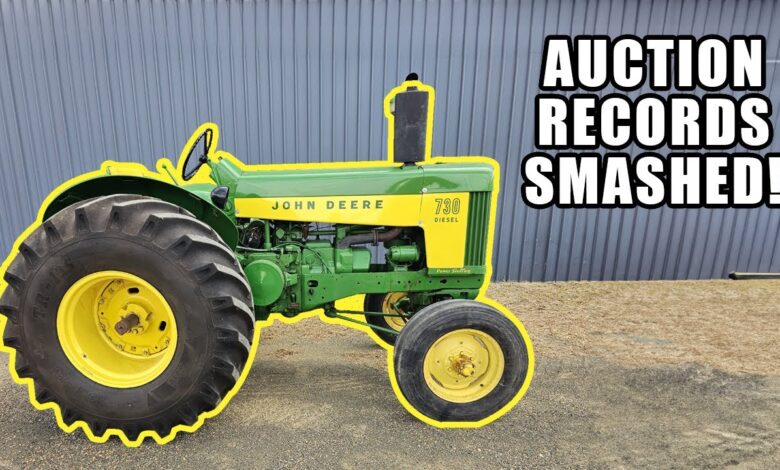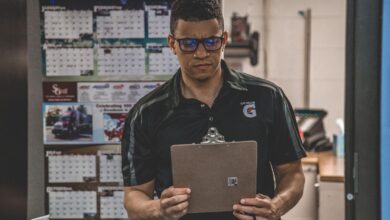How to Score Big at Local Tractor Auctions

Whether you are in the market to buy or sell equipment, auctions can be an excellent place to find bargains. The right strategy for preparing and attending can help you get the most out of your experience. If you plan on buying a tractor at an auction, research. Look for information about the equipment online, and ensure you know its history. Ask to speak with the private seller directly so that you can learn more about the equipment and why it is being sold. This can also help you determine if there are any liens against the tractor, which may impact your decision.
Know Your Limits
Auctions can be great places to find what you want if you are a tractor collector or have a hobby of working on old tractors. However, the sheer number of tractors at one location can quickly add up, so knowing your limits is important. Research ahead of time is a good way to set your bidding limits. Most tractor auctions near me list the tractors available on their website, allowing you to compare new and used prices. This will let you know what you should bid for the desired machine. Another thing to remember is that at most auctions, you are allowed to try out a tractor before making your final decision. This will let you see how the vehicle rides and whether the controls are comfortable. If a tractor seems clunky or not as smooth as you’d like, it may be best to pass on that one. Also, be wary of any equipment that won’t start or shows mechanical issues during the demonstration.
Know What You Want
Whether buying a new or old tractor, knowing what you want will help determine which auctions to attend. For example, if you’re partial to certain manufacturers, you can search the current inventory on an auction website and compare items. When comparing equipment, pay attention to the options and specifications listed. These can add up quickly and change the amount you’re willing to spend on a particular item. You should also be aware that many auctions charge a buyer up to 10% premium. Another factor to consider is whether the equipment has been properly maintained. Ideally, the seller will have documentation showing a history of maintenance work and inspections. It may be worth passing on if a tractor needs better care. If you need more clarification, ask a mechanic to look. Mechanics can spot rust, corrosion, and other problems you might miss. They can also tell you if the machine is reliable enough to meet your needs should you win it at auction.
Research the Inventory Listings in Advance
When you have a clear idea of what you want, researching the inventory listings in advance can help you decide which auction events to participate in. Most websites list the equipment by manufacturer, so if you’re partial to certain models, you can get a head-start when choosing which auctions to attend. Knowing the manufacturer of a machine in advance can also help you rank the devices you’re interested in so that if one goes over your maximum bid, you have another to consider. This will keep you from overspending.
Have a Reliable Mechanic Inspect the Machine
When purchasing equipment at auction, you never know what you will get. Even if you have a specific piece of machinery in mind, having a trusted mechanic inspect the machine in advance is a good idea to ensure it is in working order. Missed damage and needed repairs can be costly to your business. The first step in the inspection process is to verify the serial number and odometer to establish the year, make, and model of the tractor you are considering buying. Then, look at the tires (regarding their make, size and quality of tread) and rims and check for any cracks or deficiencies. You should examine the rollers for excessive wear if the tractor has tracks. You can also test the steering capabilities by driving it repeatedly to check for any looseness. If you feel a knock when moving the tractor, this may indicate a transmission slip. You can also ask the auction house if they have documentation such as maintenance logs, work orders, and inspection lists to see if the equipment has been maintained properly.
Make Offers
Whether you’re looking for a late-model, high-horsepower tractor or something 10-20 years old that can get the job done, auction events are an excellent place to start your search. Tractor inventories have thinned over the past year, and prices have been trending upwards. The market is especially strong for small tractors with low hours and good track records that can fit on smaller properties. The appearance of a machine also matters – just like homeowners are advised to paint or make minor repairs before putting their homes on the market, doing some small things to your equipment will increase its value and make it easier to sell. Deep-cleaning your tractor and removing any signs of wear and tear will give it more appeal to potential buyers. It’s also a great idea to keep track of your maintenance schedule and any repairs you have made to your equipment so that you can share that information with bidders when the time comes to sell. This will help them feel confident that the equipment they are purchasing is well-maintained and ready to work for them.



